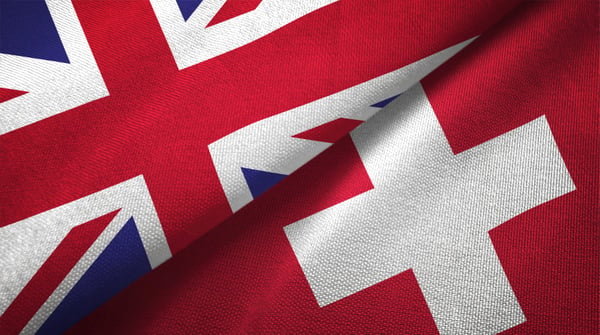When Brexit formalities took place on 1 January 2021, the UK was immediately subject to new customs and trade standards, both by the EU as well as third countries that had trade agreements with the EU, which previously applied to the UK. The UK and Switzerland had been in negotiations for quite some time over how trade would work between the two countries post Brexit, so on 1 January 2021, when Brexit ensued, the UK-Switzerland Free Trade Agreement (FTA) immediately took effect.

The UK-Switzerland FTA mostly replicates agreements between Switzerland and the EU. While there are no restrictions on overseas businesses exporting their goods to the UK, UK businesses exporting to Switzerland should become familiar with the changes in legislation regarding the trade in goods and Rules of Origin.
Trade in goods
The tariff rates for bilateral trade will continue to apply. Lower non-preferential rates may apply due to the UK Most Favoured Nation (MFN) tariff schedule.
HMRC has published a duties and customs procedures guide as well as a web-based tool to look up tariffs, taxes, and rules for UK companies exporting goods to Switzerland.
Tariff rates and import quotas have changed slightly. The parliamentary report gives guidance on these changes for imports from Switzerland to the UK in Table 5 (page 31) and imports from the UK into Switzerland in Table 6 (page 38).
Exporting to Switzerland is governed by international systems. HMRC has set forth guidance on importing or moving live animals, animal products, and high-risk food and feed not of animal origin.
Organic goods can be exported to Switzerland as long as the product is accompanied by a certificate of inspection from a UK control body.
Rules of Origin
A Certificate of Origin is required to claim preferential exporting rates. The design of the certificates will remain the same and will only differ in their place of origin, which is now the UK instead of the EU. Both EUR1 and EUR-MED forms remain valid.
Processing or using EU materials in exports to Switzerland is still possible as long as the processing and works carried out in the UK go beyond the minimum and other relevant criteria are met. Information on minimum requirements can be found in the FTA, Protocol 3, Article 7 (page 20).
Processing or using third-country materials in exports to Switzerland differs per country. The goods are deemed to be either originating from the UK or Switzerland if the requirements for cumulation are met. This is set out respectively in Protocol 3, Article 3 and Article 4. A list of permitted countries can be found in Annex A of Protocol 3 of the FTA (page 43).
Goods coming from the UK transiting through the EU or any other country with cumulation will not be subject to third-country transit restrictions.
Goods originating from Liechtenstein will be treated as Swiss goods.
A transport agreement has been signed between Switzerland and the UK ensuring the continuity of hauliers with a community license in Switzerland.
Keep up on the ever-changing world of customs by following C4T on LinkedIn, Twitter, Instagram and Facebook, or bookmark the C4T Inspire blog.